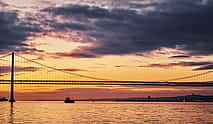



Lisbon Sunset Cruise on the Tagus River, Portugal
A two hour sailing boat tour on the Tagus river is the perfect way to discover Lisbon city from the best perspective. Admire the city sightseeing from a unique point of view and a beautiful sunset while sailing the calm water of the Tagus river on board a luxurious and comfortable sailing yacht. See sights such as the Belém Tower, Terreiro do Paço passing by Cristo Rei, Discovery Monument and the 25th April Bridge.
Highlights:
Sail in Tagus river towards Lisbon center
Torre de Belem monument seen from the exterior
See the statues of the people from the Discovery period
The April 25 Suspension Bridge
The statue of Christ in Lisbon
St George castle
Sailing boat cruise by the Tagus river
Includes:
2-hour sailing boat cruise
One drink per person (water, beer or soft drink)
Light snacks (peanuts or crackers)
Guide service
Not included:
Hotel pickup and drop-off
Dinner
Please note: children must be always mentioned in the booking as they count towards the boats maximum occupancy. Minimum drinking age is 18 years. Minimum number of people apply. There is a possibility of cancellation after confirmation if there are not enough passengers to meet requirements. In the event of this occurring, you will be offered an alternative or full refund. Subject to favorable weather conditions. If canceled due to poor weather, you will be given the option of an alternative date or full refund.
In Lisbon, one cannot pass by a unique monument of Portuguese Renaissance architecture - the Belem Tower, towering over the waters of the Tagus River. The Portuguese erected this fortified fort in honor of the famous expedition of the navigator Vasco da Gama, who opened the way to India.
The tower was originally conceived as a five-tier fortress-lighthouse. Its construction was carried out in the period from 1515 to 1521 under King Manuel I. It was from here that the brave Portuguese navigators set off in search of new trade routes. Some time ago, the Tower served as a prison and armory.
The tower is richly decorated with images of ropes, openwork balconies, Arabic-style turrets, battlements and even the coats of arms of a knightly order. This magnificent building, whose height is 35 meters, is considered the brightest example of the late Gothic "Manueline" style, typical of Portuguese architecture. Starting from the 19th century, this monument was chosen by romantics and it began to attract travelers. In 1983, the tower was included in the UNESCO World Heritage List.
The April 25 Suspension Bridge connects the city of Lisbon with the municipality of Almade and crosses the confluence of the Tagus River into the Atlantic Ocean. The idea of creating a bridge connecting Lisbon with Almada arose as early as 1876, but only in 1953 did the Portuguese government form a commission whose main task was to organize rail and road traffic between the capital and the south bank of the Tagus River. In 1958, an official decision was made to build the bridge, and in 1959 an open international competition was announced for its project. On May 9, 1962, the United States Export Steel Company won the competition, and on November 5, 1962, construction began on the bridge.
The statue of Christ in Lisbon was built during 1949-1959. Funds for its construction were collected by Portuguese women. Portugal did not participate in the Second World War, and in gratitude to God that he spared the defenders of the Fatherland, the citizens of the country donated money to build some kind of sign of gratitude. In 1984, chapels appeared here, and in 2010, Pope Benedict XVI honored the complex with his presence.
Saint George's Castle can be seen from almost anywhere in the city. Its oldest parts date from the 6th century, when it was fortified by the Romans, Visigoths, and eventually the Moors. It served as a royal Moorish residence, until Portugal's first king, Afonso Henriques, captured it in 1147 with the help of northern European crusaders on their way to the Holy Land. It was later dedicated to St. George, the patron saint of England, commemorated the Anglo-Portuguese pact dating from 1371, and became the royal palace until another one (that was destroyed in the Great Earthquake) was built in today's Comercio Square.